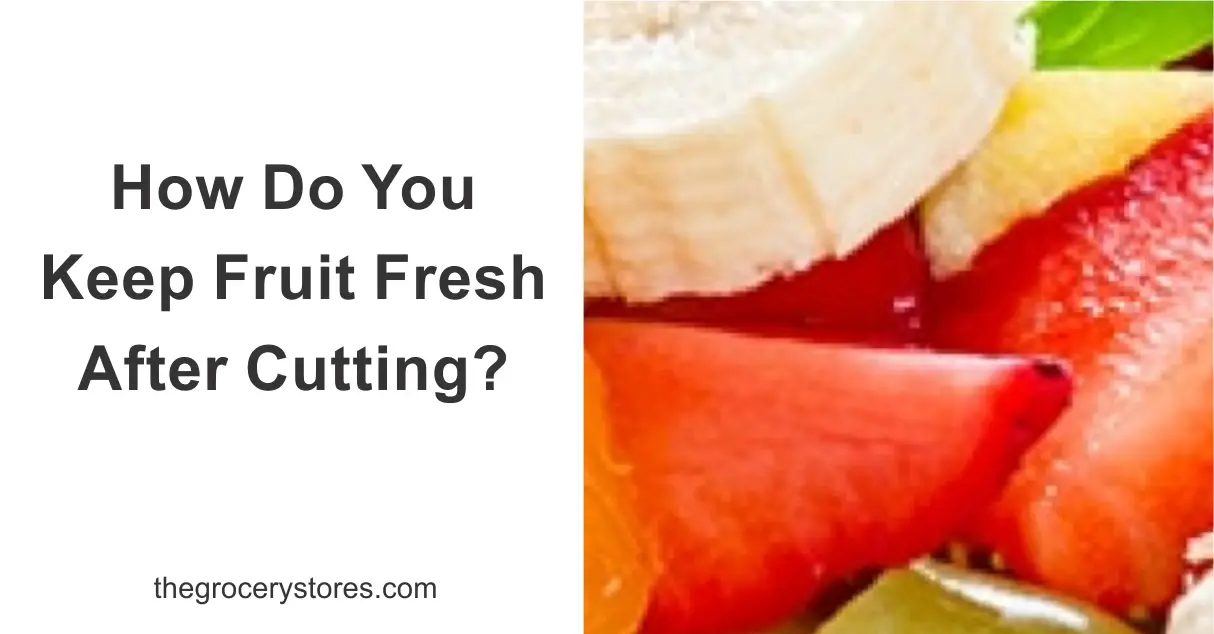Fruits are one of the edibles that get spoiled or lose their nutritional value the quickest. The most preferable way to preserve fruits is to leave them untouched without washing the skin till it’s time to eat them. However, you must not wait too long before cutting if you are not ready to consume it. Just make sure you put it in an airtight container and refrigerate it.
The major factors that cause already cut fruit to spoil easily are oxygen, heat, and light. So it is better to leave them in larger pieces because the less the surface area, the less the exposure to oxygen. It also helps the vitamins in the fruit be retained.
It is also important to note that the knife should be very clean and sharp. This is to avoid bruising the fruits or vegetables, especially when you want to store them for later consumption. Using a dull or dirty knife makes the calcium in the fruit leak off and introduces bacteria that can lead to spoilage.
Can fruit be cut up ahead of time?
When fruits are cut, they are prone to losing their essential nutrients through oxygen, heat, and light. Fruits with skins that do not really require peeling for consumption. It is better to eat them in their original state after rinsing.
Just like humans, fruits are actually protected from harsh factors like too much heat by their skin. Therefore, when it is cut, what suffers the most are the nutrients. Especially those fruits that contain vitamin C. Do not think that other vitamins like A and E will not be lost as well. They will, but not like vitamin C.
If you must cut your fruit for later use, make sure you use a sharp knife and store it properly. Otherwise, fruits will begin to look bad even when the nutrients are still intact. Now imagine how it will look after some days. As soon as you notice the fruit has turned brown or indicates the presence of mold, do not eat it or try to recycle it. Throw it away because you will not be benefiting from any nutritional value from it.
What is the stuff you put on fruit to keep it fresh?
The sight of fruit can either attract you even if you are already full or make you lose appetite. It just depends on how you store, cut, and present it. If you do not preserve fruits properly, the enzymes on the cut fruit and oxygen will react, making your fruit turn brown.
To prevent the fruit’s brown color after cutting, coat the fruit with sugar syrup or salt. This will protect the cells from exposure to air. You can also preserve the color by immersing the fruit in lemon or lime juice. It is effective because the juice contains citric acid, which does not support the chemical reaction that turns the fruit brown. It also gives your fruit a unique and enjoyable citrus flavor at the same time.
Pickling gives the same effect as lemon juice gives to some fruits. Fruits like pears are easily turned brown by oxidation after cutting. You can cut and store them in a jar that contains sugar and flavored vinegar. It can last up to a year and does not just prevent the change in color.
Should you store fruit in an airtight container?
Fruits are one of the easily wasted foods because the preservation of fruits without having any knowledge of it is very hard. You might even help them rot and get spoiled if you do not store them properly.
Just like humans need enough air to breathe and survive. Most fruits need air or low humidity to stay fresh. If you are keeping a fruit that loves air in an airtight container, you are basically increasing the rate at which they get bad and cutting off their air supply.
However, to every rule, there is always an exception. Dried fruits should be kept in an airtight container, unlike fresh ones. This reduces the oxygen flow and moisture, allowing them to remain dehydrated.
Why should we keep cut fruits covered?
Lemon juice stops fruits from oxidizing after being cut. By preventing browning and loss of crispness. Juice from one lemon can fill a 1.5-quart bowl of cut fruit. Simply squeeze it on the fruit and brush it with the juice to avoid damaging it. Keeping the fruits apart is the best strategy for getting the best results. Kiwi fruit contains a lot of citrus acid by itself, so it doesn’t need much lemon juice. Fruits should be kept in the fridge after adding lemon juice.
Covering is essential in order to keep your fruit from absorbing other refrigerator odors, and the holes allow the fruit to breathe. This approach is not, however, foolproof. Due to its exposure to outside air, there is still a slight possibility of oxidation.
Your cut fruits can be kept in bowls covered with plastic wrap or aluminum foil if you don’t like the first suggestion because it might change the flavor from the beginning. Do not forget to puncture it with a few holes.
How long can fresh cut fruit sit?
The respiration speed of fruits will be increased once they are cut. They react highly with oxygen because they contain vitamins that are antioxidants. All these lead to the breakdown of sugar and the release of carbon dioxide. Final results are faster spoilage and a difference in the taste and feel of the fruit.
When you cut fruits like pineapple, the vitamin C is removed by the water used to wash the fruit or by the fluid released. Meanwhile, vitamin D does not really leak out easily. If you do not cover or store the fruit properly, 6 hours is enough time for you to start noticing a brown color. Keeping for a day would lead to fermentation. You would even notice a change in size and smell.
What mainly determines the time your cut fruit will sit for is the temperature. The lower the temperature, the slower the rate of respiration. So after cutting, put it in the refrigerator.
How long will chopped fruit last in the fridge?
Due to the fact that there are different kinds of fruits, they also do not have the same shelf life when stored in the fridge. The period of time a fruit will last in the fridge differs from others. Some will stay for up to a month, while others will last just a few days. They are also affected by several factors.
Fruits like apples and pears do not last long in the fridge. 3 to 5 days should be the maximum they should be left in the fridge, especially when they are not pickled. Other fruits can stay for up to a month with constant sorting and temperature control.
Note that sorting your fruit properly before storing it is very important. Fruits like apples should not be kept with others when storing. But you can store oranges, lemons, and limes conveniently with other fruits because of the citric acid they contain.
Most of the fruits we purchase from stores were harvested when they were still unripe and have been stored at low temperatures. This makes them dormant till they are taken to the store, where the process of ripening begins when we buy them. These kinds of fruit should not be left in the fridge for too long because they will have a very rapid ripening stage.
How do you make fruit last longer in the fridge?
When storing fruit, it is a necessity to consider some basic factors that may interfere, like temperature, ethylene, and airflow. A whole lot of produce does well when refrigerated, but others are much preferable at room temperature.
Most produce that is refrigerated will have the most desired result when sealed in containers or plastic bags. This container holds in moisture and protects sensitive produce from the effects of ethylene gas.
So when storing your fruit in the fridge, produce like apples, grapes, and berries will last longer if preserved in their ideal packaging.
Fruits and vegetables should not be stored together in the fridge.
Plastic bags with tiny openings should be used as they help keep fruit fresh by releasing moisture.
Fruits like apples tend to hasten ripening in other fruits and vegetables, so it is advisable that they are stored in a separate place in the fridge.
Does fruit last longer in water?
Fruits and vegetables are very essential parts of our diet, so we want to preserve them to last us a long time and also retain their necessary nutritional value. Adopting a storage method should be fully dependent on the type of fruit we want to store.
It may sound contradictory, but storing some, not all, fruits in water is a very effective way to help maintain their freshness. This can be achieved by storing them in fresh, cool water and endeavoring to change the water when necessary to help prolong the fruits.
Water is very effective in the storage of cut apples and also helps to preserve guacamole greens.
What fruits should not be refrigerated?
Refrigerators go a very long way to preserve and conserve the freshness of food we want to keep for later. However, you should be aware that not all fruits should be put in a refrigerator. Because refrigerating certain fruits can reduce their quality and flavor. They also lose their nutritional content and get damaged easily.
If you have any of the following fruits in your refrigerator and are planning to consume them, you are doing the wrong thing, because they would have added no nutritional value to you. Although you can refrigerate them just 20 minutes before eating if you want a refreshing bite.
- Apples
- Avocado
- Apricots
- Berries
- Bananas
- Peaches
Other fruits like oranges, lemons, and limes should be kept at room temperature. Also, do not keep them too close to each other in your kitchen cabinet or wherever you store them to avoid mold formation.
Do mason jars keep fruit fresh?
You probably enjoy eating fruit or just having enough fruit in your house. But one thing that limits and discourages you is spoilage after coming back from the grocery store. The good news is finally here.
As soon as you get home from purchasing the fruits, the first thing is to remove them from the nylon or bag they came in. Then wash them with a tablespoon or more (depending on the quantity of fruit) of vinegar. Allow it to soak for about 15 to 20 minutes. This process helps to eliminate any bacteria on the fruit.
Bacteria is one major reason your fruit will get bad quickly. After soaking, remove the fruit from the vinegar and rinse again with fresh water that is not warm or hot. Allow the fruit to dry off on a surface or towel. Transfer the fruit, after drying and making sure there are no traces of water left on the fruit, to a mason jar.
Do not be afraid of spoiled fruit once you have done the aforementioned process. Only open when you want to take a fruit out. And keep it in a cool environment. I’m sure you know that one bad apple can affect others. Therefore, make sure you sort the fruit very well, as this step is very important to enjoy fresh fruit preserved in a mason jar.

